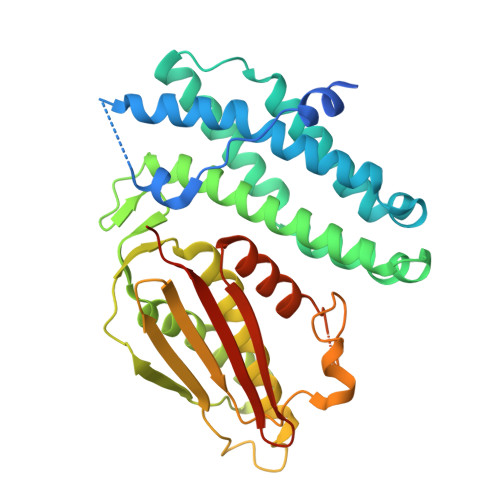Discovery of First Branched-Chain Ketoacid Dehydrogenase Kinase (BDK) Inhibitor Clinical Candidate PF-07328948.
Filipski, K.J., Martinez-Alsina, L.A., Reese, M.R., Evrard, E., Buzon, L.M., Cameron, K.O., Zhang, Y., Coffman, K.J., Bradow, J., Kormos, B.L., Liu, S., Knafels, J.D., Sahasrabudhe, P.V., Chen, J., Kalgutkar, A.S., Bessire, A.J., Orozco, C.C., Balesano, A., Cerny, M.A., Bollinger, E., Reyes, A.R., Laforest, B., Rosado, A., Williams, G., Marshall, M., Tam Neale, K., Chen, X., Hirenallur-Shanthappa, D., Stansfield, J.C., Groarke, J., Qiu, R., Karas, S., Roth Flach, R.J., Esler, W.P.(2024) J Med Chem
- PubMed: 39560668
- DOI: https://doi.org/10.1021/acs.jmedchem.4c02230
- Primary Citation of Related Structures:
9DI9 - PubMed Abstract:
Inhibition of branched-chain ketoacid dehydrogenase kinase (BDK or BCKDK), a negative regulator of branched-chain amino acid (BCAA) metabolism, is hypothesized to treat cardio-metabolic diseases. From a starting point with potential idiosyncratic toxicity risk, modification to a benzothiophene core and discovery of a cryptic pocket allowed for improved potency with 3-aryl substitution to arrive at PF-07328948, which was largely devoid of protein covalent binding liability. This BDK inhibitor was shown also to be a BDK degrader in cells and in vivo rodent studies. Plasma biomarkers, including BCAAs and branched-chain ketoacids (BCKAs), were lowered in vivo with enhanced pharmacodynamic effect upon chronic dosing due to BDK degradation. This molecule improves metabolic and heart failure end points in rodent models. PF-07328948 is the first known selective BDK inhibitor candidate to be examined in clinical studies, with Phase 1 single ascending dose data showing good tolerability and a pharmacokinetic profile commensurate with once-daily dosing.
Organizational Affiliation:
Pfizer Research & Development, 1 Portland Street, Cambridge, Massachusetts 02139, United States.



















